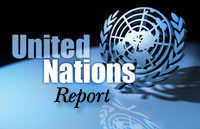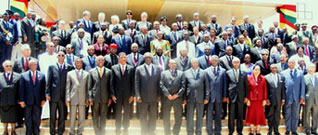
UNITED NATIONS (FinalCall.com) – Trinidad and Tobago’s Minister for Foreign Affairs Paula Gopee-Scoon told the United Nations General Assembly Sept. 27 that her nation “sought to partner with African countries to develop long-term strategies for sustainable development and use of their energy resources.”
A few days later, government ministers from African, Caribbean and Pacific nations met in Accra, Ghana, for the 79-nation ACP summit, and according to Caribbean Net News, the leaders said developing nations must take steps to make sure they don’t “disproportionately” pay for problems that were not their creation–referring to the global banking crisis. The ACP was formed in 1975 with the backing of 48 sub-Saharan African nations, 16 from the Caribbean and 15 Pacific states.

The government ministers warned the West not to use the current financial crisis to default on aid pledges, or default on trade deals with Caribbean nations, according to Reuters.
In 2005, the industrialized nations known as the G-8 promised to donate $25 billion to ACP nations by 2010, but observers say only $4 billion has been sent, which has caused some ACP ministers to hope their trade with China, India and Brazil could initially shield them from the worst effects of current global financial chaos.
“It’s a change in the neo-liberal paradigm,” said James Early, director of Cultural Studies at the Smithsonian Institute in Washington, D.C., and a board member of the Washington, D.C.-based lobby Trans Africa Forum. “What this means is that CARIOM (the Caribbean regional body) is making its moves to join hands with Latin America and Africa in unity across the vast spectrum of development and trade,” Mr. Early said.
Looking at cooperation and joint agendas leaders Hugo Chavez, president of Venezuela, and Evo Morales, president of Bolivia, are calling for in the region, CARICOM is ready to leverage its sphere of power, said Mr. Early. That the sphere of power is based on the ability of Caribbean nations to be more self-determined and self-sufficient, which gives them better control over development of sound infrastructure, without being enslaved to debt from the West and having control of energy issues that include more South-South cooperation, according to Mr. Early.
“Right now the Caribbean and Latin America are the most dynamic places in the world,” he said.
Emira Woods, co-director of Foreign Policy in Focus, agrees with Mr. Early. The dynamics of African/African Diaspora unity are in place, she said. The African Union opened the door when it declared the Diaspora the “Sixth Region” of the continent, Ms. Woods noted.
Cooperation between Mother Africa and the Diaspora is the “challenge of the 21st century,” given the failure of the Western economic model and developing nations rejecting a model that has failed them for too long, she added.
In Aug. 2007, at the African Diaspora Global Conference in Bridgetown, Barbados, leaders endorsed a plan of action to explore institutionalization of mutual goals between Africa and the Caribbean.
According to Claire Nelson, a board member for the Washington-based Institute of Caribbean Studies, the phenomena seen today between the Caribbean and Africa has been some 100 years in the making. The movement goes back to the early 20th century, during the heyday of Marcus Garvey’s Back to Africa Movement, she said.
“And from my position as just an observer, the movement is coming to pass. Leaders on the continent and in the Diaspora are coming together to share knowledge, and most importantly to move from talk to action,” she said.
On Oct. 3, an 11-member delegation from the East African Community Secretariat, representing Rwanda, Tanzania, Kenya, Uganda and Burundi conducted a three-day study of the CARICOM secretariat to draw on the Caribbean body’s experience in developing regional interaction.
The East African Community Secretariat ministers wanted to study the role CARICOM played in the integration process, which has led to a Single Market Economy concept. It merges national markets into regional markets to compete in global trade.
“We in the Caribbean may share with the African Union how to avoid some of the pitfalls and potholes in global trading and to create the next outpost to sell our intellectual capital, which may no longer be available to the West,” Ms. Nelson said.












